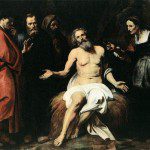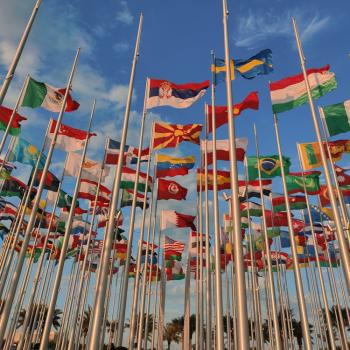Salvian, living in fifth century Gaul, had the gall to speak out against the abuses of his day, showing what the true Christian spirit should be in regards to society. Mercy and justice should be mixed together, with the rich elite having a greater responsibility than any other to make sure society is just and the underclasses are treated with dignity and respect. When society fails the vulnerable, when it ignores the pleas of the needy and only accords the desires of the rich elite, it is bound to fail, and its failure can be seen as the judgment of God. Salvian should be recognized as having a central place among the great Christian writers on social justice: indeed, more than any other in his time, it was at the forefront of his thought and concern. Rome was falling because Christians failed to live out their proper calling; once Rome had become Christian and was put in charge by Christians, its elites were expected to live out the dictates of Christ, the dictates of justice and mercy, but instead they continued to trample upon the general populace and so created the condition for their own downfall.
![Pope Leo XIII [Public domain], via Wikimedia Commons](https://wp-media.patheos.com/blogs/sites/637/2016/12/Leo_XIII.-237x300.jpg)
The richer class have many ways of shielding themselves, and stand less in need of help from the State; whereas the mass of the poor have no resources of their own to fall back upon, and must chiefly depend upon the assistance of the State. And it is for this reason that wage-earners, since they mostly belong in the mass of the needy, should be specially cared for and protected by the government. [6]
Those who decry the state working for the common good have decried the common good itself. They often hate the state, and the idea of the state, because they know it can and will make sure there is a limit to their action. But when the state can be taken over and used by them for their own personal advantage, so as to loot society further and use the rule of law as a means to hinder justice, they then pretend to love the state and honor it, demanding everyone else to do so as well. Thus, they love the state, and use its powers, when it can be used to keep the underclasses at bay, using its powers to harshly punish minor infractions, while demanding government to have little to no power to hinder the elite, and instead suggest something else, like a pseudo “free market” as being the authority which determines the consequences for the rich when they do wrong. Since they would then possess money, they would then possess the means by which those consequences are determined, which, unsurprisingly leads to the conclusion that they suffer no consequences for whatever crimes they themselves do (so long as they get their wish and the state is made weak in regards to the enforcing justice upon the rich).
In Laudio si’, Pope Francis put on display the kind of doublespeak involved here:
To ensure economic freedom from which all can effectively benefit, restraints occasionally have to be imposed on those possessing greater resources and financial power. To claim economic freedom while real conditions bar many people from actual access to it, and while possibilities for employment continue to shrink, is to practise a doublespeak which brings politics into disrepute.[7]
Indeed, it is doublespeak, because they think such freedom is only good for themselves, and having it and the power which their wealth and resources gives them, they then undermine the freedom of the underclasses, preventing them from being a true threat to their position of power and authority. They talk about freedom, but behind such talk is the attempt to thwart the freedom of others, saying if they are not free to do so, there is no such freedom – but how is what they offer freedom if the end result is the majority in society find themselves incapable of possessing that freedom?
Pope Francis was right in pointing out how they bring politics into disrepute, for in all their talk about how governmental regulations hinder freedom, they are promoting the cause of the elite and only the elite, while everyone else then has no protection for their own personal freedom when the elite then use what power they have to keep everyone else in check. They claim governmental regulations hinder freedom, when all they do is protect those who do not have the power and power to be free. The rich often say such regulations hinder the development of a nation, preventing workers from getting jobs, and from companies being able to offer jobs. But of course, what they mean is they want slave workers who will be paid little to nothing, so that they can have the greatest amount of profit with little to no real expenditure on the people who make the profit possible. They will say it is needed for the sake of a country, to get it back to work, to make it great again, but all it will do is allow the rich to loot the country before it collapses. As happened in the past, so in the future: if the rich get their way, they will hinder all true healthy development in society, so that in the end, such a society will collapse upon itself, as Pope Benedict XI hinted:
Lowering the level of protection accorded to the rights of workers, or abandoning mechanisms of wealth redistribution in order to increase the country’s international competitiveness, hinder the achievement of lasting development.[8]
Indeed, not only is lasting development hindered, the abuses which ensue will cry up to heaven, as stated by Pope Leo XIII:
Doubtless, before deciding whether wages axe fair, many things have to be considered; but wealthy owners and all masters of labor should be mindful of this – that to exercise pressure upon the indigent and the destitute for the sake of gain, and to gather one’s profit out of the need of another, is condemned by all laws, human and divine. To defraud any one of wages that are his due is a great crime which cries to the avenging anger of Heaven.[9]
It is not just basic wages, it is a way of life, where everyone should be guaranteed basic dignity in life, as St. John Paul II wrote:
Besides wages, various social benefits intended to ensure the life and health of workers and their families play a part here. The expenses involved in health care, especially in the case of accidents at work, demand that medical assistance should be easily available for workers, and that as far as possible it should be cheap or even free of charge.[10]
Society has to be just. Those who find themselves in the higher tiers of society have more, not less, responsibility to make sure it is just for others. When they seek to solidify their position in society, they remove all the protections the underclass have under the mantle of freedom, but in doing so, they undermine the whole of society itself, with only a few actually receiving that freedom in truth. Instead, freedom, for it to exist, must not be for a select few, and to make sure it remains, must be bounded by laws and regulations which protect the inferiors in society from the abuses of the elite. Sadly, as in the day of Salvian, so we find in our day, the rich are getting richer at the expense of all others. The rich justify themselves by undermining the worth and dignity of all others, often getting the abused to fight amongst themselves instead of seeing where the true immoral activity is coming from. And if things are not changed for the better, there will be a day of reckoning, which will be far worse than what happened to Rome. This is because the cry has become greater than ever before.
[1] Salvian, The Governance of God. Trans. Jeremiah F. O’Sullivan (Washington, DC: CUA Press, 1962), 94.
[2] It is important to remember the slavery system in Rome was quite different from the system which would be produced centuries later in the modern age, which is why often the words used for slaves are often translated as “workers” or “servants” instead of slave in modern translations. They were, in many respects, the common labor force of the past, making them far more like the common laborer of today than the slaves of the modern age.
[3] Salvian, The Governance of God. Trans. Jeremiah F. O’Sullivan (Washington, DC: CUA Press, 1962), 95.
[4] Salvian, The Governance of God, 96.
[5] Salvian, The Governance of God, 96.
[6] Pope Leo XIII, Rerum Novarum. Vatican Translation. ¶ 37.
[7] Pope Francis, Laudito si’. Vatican Translation. ¶129.
[8] Pope Benedict XVI, Caritas in veritate. Vatican Translation. ¶32.
[9] Pope Leo XIII, Rerum Novarum, ¶ 20.
[10] Pope St. John Paul II. Laborem Exercens. ¶ 19.
Stay in touch! Like A Little Bit of Nothing on Facebook:
A Little Bit of Nothing












